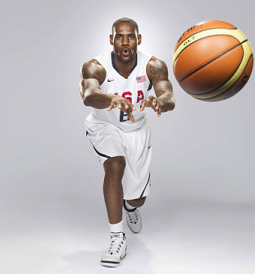Can Participating in Sports Make You Better at Everyday Tasks?
September 25 2011
Can cognitive skills attained through participation in sports transfer to your everyday life?It is clear that expert athletes outperform less skilled athletes in sport specific skills requiring attention, speed, perception and so forth.

But can these sport specific abilities transfer to every day multitasking activities like driving and talking on your cell phone?
What was the purpose of the study?
Purpose: The purpose of the study was to find if athletes can do everyday tasks better than non-athletes. It is assumed that participating in sports relates to multitasking and increased processesing speed that can carry over to similar tasks in daily life
What was the design?
Participants: The study recruited 18 Division 1 athletes and 18 non-athletes. The sport the participants played included baseball, gymnastics, swimming, tennis and so forth. Non-athletes were not involved in any university organized sports.
What was the outcome measured?
Street Crossing: A virtual reality street crossing task was used as the test. It involved crossing a virtual intersection while avoiding traffic.
Just to add some fun, they performed street crossing task under three distraction conditions-no distraction, conversing on a cellular phone with a hands-free device, or listening to music through headphones on an iPod.

The participants were instructed to walk and not run.
What were the results?
Atheletes better: The athletes showed statistically significant higher success rates (75% vs 50%) in crossing the streets reflected by fewer collisions with moving vehicles. This was also true for the distracted conditions too.
Other Studies: Other studies have confirmed that athletes perform better than non-athletes in laboratory testing of cognitive measures which includes processesing speed and tests of attention. As expected, athletes from interceptive sports like basketball, baseball, soccer showed the largest gains.
Practical applications
-
Participating in sports may help you become better at real life activities which require multitasking and greater processing speed.
-
The study however do not exactly answer the question if these cognitive differences are due to adaptation to training , practice, or just simply better genetics that predispose them to be athletes.
-
A neat little study would be to take inactive people, make them participate in a sport, and test if they improve in everyday tasks compared to a control group.
Reference 1
Related Articles
| Mon September 26, 2011
Good stuff, Anoop!
There are some studies showing a higher production of BDGF in the brain and other biological factors that could improve cognition in people who begin training compared to non-active.
If this would mean people get better at everyday tasks (and cognition) can not be answered with these studies, though. (as you know)
It is hard for me to believe there are no studies, like you suggest at the end of the article, done on elderly for instance.
| Mon September 26, 2011
2nd line “less killed athletes in sport specific skills” I assume it’s not supposed to be “less killed” :p
Interesting stuff.. but does make me wonder if sports made them better at everyday tasks or if the same thing that made them better at everyday tasks made them better at sports too..
| Mon September 26, 2011
Nice ! Could you please give a link to the research ?
Anoop | Tue September 27, 2011
Hi Full Deplex,
Thanks!Good point. I think there are two human studies which showed improvement in cognitive functioning recently in elderly. It was shown in rats earlier.
I think there is a difference between just simple exercise like running and lifting and participating in sports which requires multitasking, increased processesing speed and attention.
Thanks Karky. Changed the ‘killed’.
That is an interesting question. I think that is real possibility. The D1 athletes are just one tier below the pro level and are pretty genetically gifted to get that level.
I do think the control group is chosen ‘wisely’ to make sure they find a difference.As I wrote, I would love to see a study where they take inactive people, make them play a sport and compare to a control group. That would make a real good case for playing some sports in the backyard. Anyone doing a master’s thesis?
Hi Israel,
I added the link. Thanks for the reminder.
| Thu September 29, 2011
I’m doing a master, but I’ve already chosen a topic :p
| Mon October 03, 2011
Just throwing it out there.
“Exercise training increases size of hippocampus and
improves memory”
http://www.pnas.org/content/108/7/3017.full.pdf
>









